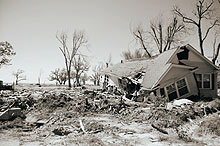"I'll be prayin' for you!"
Few things are more important than intercessory prayer for someone who is hurting. Yet this statement can feel like a throwaway slogan when the wounded friend doesn't know for sure that we are actually praying for them and doesn't know what it is we are praying for them. To keep this from simply being a throwaway slogan, we can actually place our hand on our friend and pray for them, especially for the Holy Spirit to bring comfort and strength as we ask for God's presence to be with them during their time of sorrow, pain, or grief. We can also let them know that we will pray specifically for them at a certain time each day or on a certain day of the week. Suddenly, the slogan becomes a partnership of grace - a commitment to support them regularly in their struggle to regain their hope and balance in life.
"Well you know, God works everything out for our good."
This is an incredibly powerful promise when placed in the overall context of the message in which it is found. On the other hand, these words can also feel like a command to hurry up and be happy given by someone whose life is fine while the wounded person feels his or her life is in ruins. Yet when placed in the rich vein of God's grace and of the promise of God's never failing presence in our lives through the Holy Spirit (Romans 8:32-39), this promise is powerful, transformational, and hopeful:
We know that the whole creation has been groaning as in the pains of childbirth right up to the present time. Not only so, but we ourselves, who have the firstfruits of the Spirit, groan inwardly as we wait eagerly for our adoption, the redemption of our bodies. For in this hope we were saved. But hope that is seen is no hope at all. Who hopes for what they already have? But if we hope for what we do not yet have, we wait for it patiently.
In the same way, the Spirit helps us in our weakness. We do not know what we ought to pray for, but the Spirit himself intercedes for us through wordless groans. And he who searches our hearts knows the mind of the Spirit, because the Spirit intercedes for God's people in accordance with the will of God.
And we know that in all things God works for the good of those who love him, who have been called according to his purpose. For those God foreknew he also predestined to be conformed to the image of his Son, that he might be the firstborn among many brothers and sisters (Romans 8:22-29 TNIV).
Notice several powerful truths found in these few verses.
- We live a broken existence in a broken world that groans with pain awaiting its redemption. This will not change until the day of Jesus' return and we are ushered into a new existence where the fractures of our fallen world are caught up in the glory of our revelation as God's perfected sons and daughters. This is the reason God saved us, but we have only received the first taste of the glorious future and we wait in hope for its full dawning.
- As God's sons and daughters, we've been given the Holy Spirit to live within us. In our time of waiting for glory to dawn, the Holy Spirit blesses us in many ways. When we voice our deepest longings to God - some of which are too deep and mournful to even be put into words - the Holy Spirit takes what is in the deepest recesses of our hearts and presents these longings, feelings, concerns, wounds, and sighs to God. We don't have to worry about our words being appropriate or reflecting all of our longings, we only need to point our hearts to God in prayer and the Holy Spirit brings these longings and requests to God aligned to our Father's will. Wow! What powerful reassurance!
- In the context of our broken world, our broken hearts, and the Holy Spirit's work through our prayers, we are reassured that God is at work in our lives. The Spirit takes our brokenness along our honest prayers to the Father, who promises to work in this brokenness to bring our eternal good. Our call before the Lord is to love him and to live for his purpose. As we do this, the Spirit transforms us to be like Jesus. In the darkest times in Jesus' life, God worked eternal glory, ultimate vindication, and brought us to himself as his redeemed children. In much the same way, God promises to work in our lives to bring us to himself so we can share in his glory.
As wonderful and glorious as life can be, it is still part of a broken world subjected to decay and death. Yet even in its worst moments and our most catastrophic events, God has promised to be at work in us, to be present with us, to hear our deepest cries, and to work in the heartbreak of the moment to bring us to glory. More than a slogan, this is a lifestyle transformed by grace and bound to the hope we have in Jesus.
The following are questions for your own meditation, for use in small group Bible studies, and for your comment. I'd love to hear your take on this subject and the questions that follow: http://thephilfiles.com/2009/09/30/dangerous
Why do we feel like we have to say something more than "I love you and will stand with you!" when someone faces tragedy, grief, and loss?
- What are other more meaningful things that we can do besides offer folks slogans?
Do you think some of our slogans are intended to defend God when folks are hurt, angry, or feel abandoned by God in a crisis?
- What should we do when folks feel this way toward God?
- How can we help them in ways more important that talk?
What do you consider to be the most meaningful promise found in Romans chapter 8?
- Does it help you understand our disasters to be reminded that we live in a broken world crying out for deliverance from its bondage to decay?
- Why is it important that the Holy Spirit intercedes for us regarding matters that are too deep for words?
- How are the promises of Romans 8:22-29 given power and meaning by the Christ hymn in Philippians 2:5-11 and the example of Jesus in the Garden of Gethsemane (Mark 13:32-42)?
This is part of a series of messages called, He's Still Got the Whole World in His Hands:

Messages in the series:
- Ain't Nothin' New (9.24.09)
- Pray Till Peace Comes (10.01.09)
- Sure Hope in Uncertain times (10.08.09)
- What's In Our Hands? (10.15.09)
Special thanks to Stephen Jacobs for the artwork. Please request permission before using artwork.












Comments
Have thoughts on this article? Leave a comment